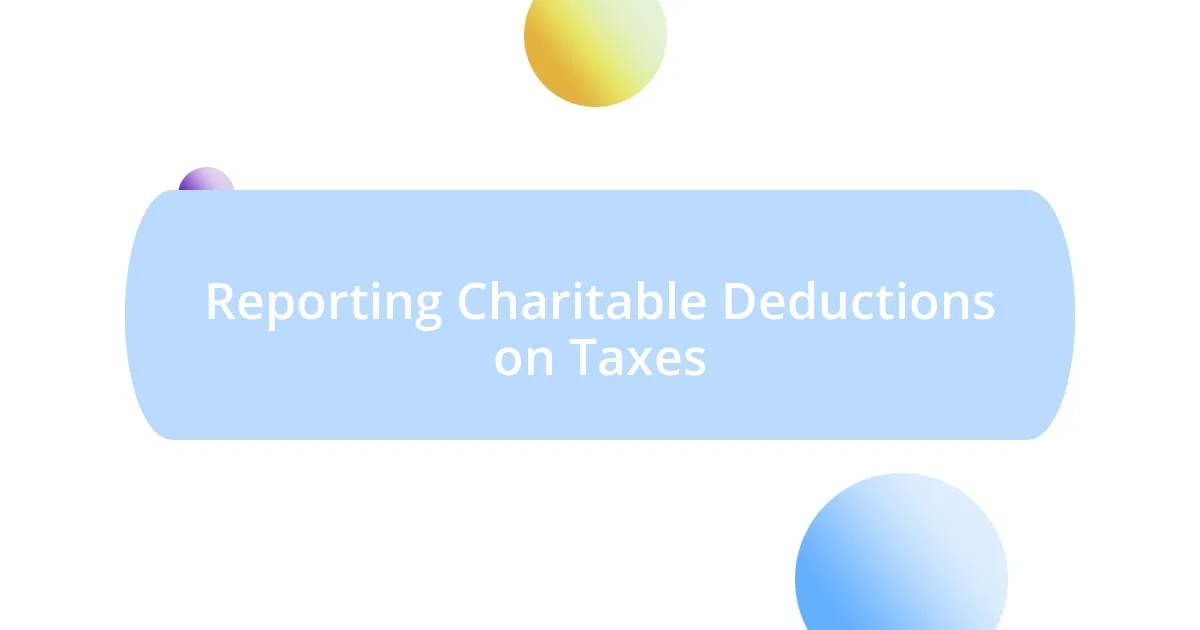Key takeaways:
- Charitable contributions to qualified organizations can help reduce tax burden, but require careful documentation and understanding of IRS guidelines.
- Donors should track all donations, regardless of size, as smaller contributions can accumulate into significant tax benefits.
- Strategies like bunching donations and utilizing donor-advised funds can maximize tax advantages associated with charitable giving.
- Consulting tax professionals or using software aids in accurately reporting deductions and understanding which expenses are deductible.

Understanding Charitable Deductions
Navigating the world of charitable deductions can feel overwhelming at first, but it’s a chance to make your giving count when tax season rolls around. I remember the first time I realized that my donations could not only support causes I care about but also help reduce my tax burden. It’s like a double win—helping others while also benefiting yourself.
Many people wonder, “What exactly can I deduct?” Generally, any contributions made to qualified charitable organizations are eligible, but the intricacies can vary. From my experience, keeping detailed records, like receipts and acknowledgment letters, is invaluable. I once made a donation to a local food bank and was surprised at how easy it was to document the gift and claim it on my taxes, which felt rewarding both emotionally and financially.
It’s important to remember that the IRS has specific guidelines regarding charitable deductions. I learned this firsthand when I discovered that not all donations are considered equal. For example, I had a garage full of clothes I planned to donate; however, only the amount assigned to their value through a recognized charity counts. This realization reinforced the idea that thoughtful giving requires not just a generous heart but also a bit of savvy planning.

Personal Experiences with Charitable Donations
I remember the first time I volunteered at a local shelter; it was transformative. While there, I decided to donate some old furniture that had been gathering dust in my garage. The moment the organizers arrived to pick it up, I felt a surge of satisfaction. It wasn’t just a donation; it was the realization that my excess could truly help someone else. Later, when I claimed that deduction, it made the experience even sweeter, knowing that my contribution had a tangible impact both for those in need and on my taxes.
As I navigated my charitable giving, certain lessons stood out:
- Always ask for receipts for any donation over a certain amount—it’s essential for documentation.
- Understand the value of items you donate; some charities provide guidelines which can help you determine fair market value.
- Remember the emotional payoff of giving goes hand-in-hand with the financial benefits. Each donation feels like a meaningful connection to the causes I care about.
These experiences shaped my approach to charitable giving, reminding me that every act of kindness counts—both on the ground and in the financial realm.

Types of Charitable Organizations
When exploring the different types of charitable organizations, it’s fascinating how diverse these entities can be. For instance, nonprofit organizations often focus on varied areas such as health, education, or the environment. I once volunteered with a wildlife conservation nonprofit, and their dedicated approach to preserving natural habitats opened my eyes to the impact that specific causes can have. Each type of organization has its own mission and methods, allowing donors like me to support the causes that resonate with our values.
On the other hand, private foundations primarily rely on their own funds and often distribute grants to other charities but do not directly operate programs. I recall researching a local private foundation that funded community arts initiatives. The thought that my donations could help support local artists was incredibly fulfilling. This understanding encourages individuals to consider how their contributions can be channeled in unique ways to foster local culture and development.
Lastly, religious organizations often engage in charitable activities, providing community outreach and support through various programs. My experience attending a church that organized food drives was heartwarming, as I noticed how the church truly made a difference in the community. Knowing that my donations helped feed families in need, while also contributing to my deductions come tax time, was a gratifying experience that exemplified the intersection of community support and responsible giving.
| Type of Organization | Characteristics |
|---|---|
| Nonprofit Organizations | Focus on specific causes, operate programs directly |
| Private Foundations | Fund other charitable activities, operate primarily through grants |
| Religious Organizations | Engage in outreach, often serving community needs |

Eligibility Criteria for Deductions
To qualify for charitable deductions, I’ve learned that specific eligibility criteria must be met. Firstly, the organization you’re donating to needs to be classified as a 501(c)(3) nonprofit by the IRS. This designation is essential because only donations made to these approved organizations are eligible for tax deductions. I remember double-checking the status of a charity before donating, just to ensure I could claim that deduction later without any hassle.
Additionally, it’s crucial to keep accurate records of your contributions, especially for larger donations. I recall giving a significant amount to a local food bank and, in return, they provided me with a receipt. This piece of documentation not only verified my contribution but also gave me peace of mind come tax season. What would happen if I hadn’t asked for that receipt? It’s a question I ask myself often when considering the importance of thorough record-keeping in charitable giving.
Lastly, charitable deductions can only be claimed if you itemize your taxes. This consideration can influence how you approach your charitable giving strategy. I remember a year when I opted to take the standard deduction and debated whether my donations were still worthwhile. I ultimately reassessed my tax strategy, realizing that planning ahead could maximize the benefits of giving while impacting my financial situation. Engaging with the tax implications of my charitable contributions has definitely made the giving experience more mindful and impactful.

Common Mistakes in Deductions
One common mistake I often see is overlooking the importance of receipts. I remember a time when I donated clothing to a charity and thought a simple thank-you note would suffice. Looking back, I realize it was naive to believe that a mention of my contribution wouldn’t matter come tax time. Without proper documentation, I missed out on claiming those deductions, which could have added up.
Another pitfall is assuming that all donations are tax-deductible. I recall discussing this with a friend who generously donated to a local amateur sports team because his son played there. He was surprised to learn that those contributions weren’t eligible for deductions. This experience reminded me that it’s essential to be informed about what qualifies as a deductible donation to avoid disappointment.
Sometimes, people underestimate the value of smaller donations. I used to think only large gifts mattered, but one year, I started tracking my smaller contributions to various causes I believed in. To my surprise, when added together, those small amounts made a significant difference on my tax return. Isn’t it interesting how every little bit can contribute to a bigger picture? Understanding this has truly shaped how I view charitable giving and deductions.

Maximizing Your Tax Benefits
Maximizing your tax benefits from charitable giving requires a bit of strategy. I remember the time I strategically planned my donations so they aligned with my tax year. By bunching donations into one year instead of spreading them out, I could itemize and maximize my deductions significantly. It felt rewarding not only to help others but also to see how careful planning could lead to tangible financial benefits.
Another aspect to consider is knowing the value of your contributions. For instance, I learned firsthand that donating items like furniture or electronics requires a fair market value assessment for tax reporting. The first time I donated a couch, I assessed its worth based on its condition and age, which turned out to be much higher than I initially thought. Isn’t it surprising how understanding the value of your donations can significantly impact your tax returns?
Lastly, engaging in donor-advised funds has been a game changer in how I navigate my charitable contributions. By contributing to a fund, I not only enjoy tax benefits immediately but also have the flexibility to distribute those donations over time. It’s like having a savings account for charity; giving feels proactive, and I appreciate the ability to support causes that resonate with me at my own pace. Could this approach transform your giving strategy too?

Reporting Charitable Deductions on Taxes
Reporting charitable deductions on your taxes can feel overwhelming at first, but I’ve found that breaking it down makes it manageable. When I first started itemizing deductions, I learned the importance of using tax software or consulting a tax professional. This not only simplifies the process but also ensures you capture all eligible donations, so nothing slips through the cracks.
One memorable tax season, I mistakenly thought I could include volunteer expenses as deductible contributions. I was disheartened to realize that while my time was valuable, the IRS only allows certain expenses, like mileage driven for charity. This experience taught me to dig deeper into the guidelines to understand what could legitimately be included, making me more diligent in my record-keeping for future tax years.
I also discovered that keeping a detailed log of my donations throughout the year makes reporting much easier. Initially, I relied on end-of-year summaries from charities, but I soon realized they didn’t always include every donation I made. By maintaining my own records, I felt more organized and confident when it came time to file, knowing my efforts would yield the best possible tax outcome. Isn’t it rewarding to see your charitable contributions recognized on your tax return?














